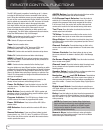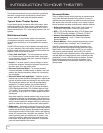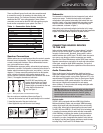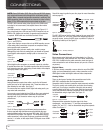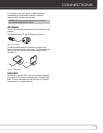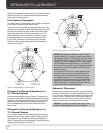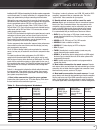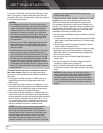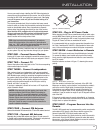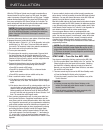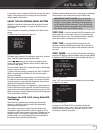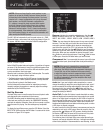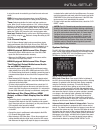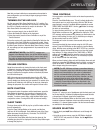
20
GETTinG STARTED
If you select an HDMI input, that becomes the AVR source for the
device. If you select a 2-channel analog audio input, that input
becomes the AVR source. The digital audio inputs will be assigned
to a source during Initial Setup.
NOTES:
• For multichannel disc players, if both the device and the
TV use HDMI connections for video, then check the owner’s
manual for the device to determine whether it transmits
multichannel audio via its HDMI output. If it does, then no
separate audio connection is required. If not, write down
the multichannel analog audio connection in addition to any
other audio type. An analog video connection, in addition
to the HDMI connection, will be required. See page 25 for
more information.
• If the device uses an HDCP-compliant DVI output for video,
then connect it to one of the AVR’s HDMI Inputs using an
HDMI-to-DVI adapter, but a separate audio connection will
always be required.
• The AUX Input jack on the rear panel requires a 1/8” stereo
audio mini-plug. Purchase a stereo audio cable with 1/8”
mini-plugs at both ends. Connect one end to the 1/8” head-
phone jack found on may portable audio players, and plug
the other end of the cable into the AUX Input jack. The AUX
Input may also be used with audio devices that have con-
ventional left and right analog audio output jacks. Purchase
a cable that has left and right “RCA-style” plugs at one end
and a 1/8” mini-plug at the other end to connect the player
to the AUX Input.
5. Decide which sources to connect to each of
the video inputs: Assign only one unique video input to
each source. Use the best type of video connection available for
each source.
• If your system-best video connection is “HDMI”, select up to
three HDMI source devices and assign them to one of the
HDMI sources.
• If your system-best video connection is “Component”, or if you
have source devices with component video outputs that weren’t
assigned to one of the HDMI Inputs, assign up to two devices
to one of the numbered Component Video Inputs.
• If your system-best video connection is “Composite Video”, or if
you have source devices with composite video outputs that have
not been assigned to any other video input, then assign the devices
to one of the four conventional sources (DVD, Video 1, 2 or 3).
The composite video inputs are dedicated to each source and
may not be reassigned. Use the composite video input for the
source you assigned to the device in number 2 above.
NOTE: If the source device is a video recorder that will
be used to record from other devices connected to the
AVR, assign the recorder to the Video 1 Input, which has a
recording output. Any of the Coaxial or Optical Digital Inputs
may be assigned to the recorder for audio, if it is capable
of making digital audio recordings. To make audio-only
recordings, assign the Tape source to the recorder. It is not
necessary to connect TiVo or PVR devices that will only record
from their direct cable or satellite television signals to the
AVR’s recording outputs.
6. Decide which audio inputs to connect to each
source: Assign only one unique digital audio input to each
digital source. Analog audio inputs are used for analog sources,
or as secondary connections for digital sources for backup or for
recording. The 2-channel analog audio inputs are dedicated to the
four conventional sources (DVD, Video 1, 2 or 3) and may not be
reassigned. Use the 2-channel analog audio input for the source
you assigned to the device in number 2 above.
• Any source using an HDMI Input requires no additional connection
for audio unless:
u
The source doesn’t output multichannel audio through its HDMI
output. Make a second connection to the 6-/8-Channel Analog
Audio Inputs.
u
The source has an HDCP-compliant DVI output for video only.
Assign a digital or analog audio input.
• For any source whose best audio connection is optical or coaxial
digital audio, assign one of the three Optical or three Coaxial
Digital Audio Inputs. Do not connect both types of digital audio
to the same source device.
• You may use one of the 2-Channel Analog Audio Inputs for
a digital source.
• You may also assign the 6-/8-Channel Analog Audio Inputs,
if available, to a digital source. See page 25.
• Use the 2-channel Analog Audio Input for the source selected
for the device in number 2 above when the device is an analog
source.
NOTE: If the source device is a digital audio recorder, it
may be used with any of the Coaxial or Optical Digital Audio
Inputs and the Coaxial Digital Audio Output. Both coaxial
and optical signals are available at the Coaxial Digital Audio
Output. To make analog recordings, assign either the Analog
2 or 4 Audio Inputs to the recorder, as both have recording
outputs.



